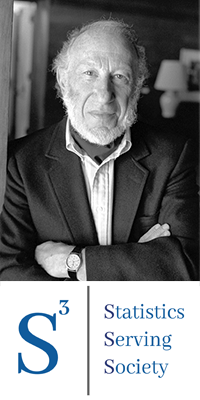[Please Note: This Ingram Olkin Forum session has already occurred. Go to the News Story for this event to read about what happened.]
Session Six: Bayes and Frequentist Approaches to Rescuing Disrupted Trials
When a study is disrupted by COVID-19, investigators are faced with the question of what to do next. Should they simply analyse the current data and reach a conclusion? If the trial is re-started with a new recruitment phase, is it permissible to change the target sample size or modify the statistical analysis plan in other ways? Maintaining credibility of trial results is crucial but the issues to be faced in achieving this are new and unusual. Our speakers will describe contrasting approaches in Bayesian and frequentist paradigms, outlining the benefits of particular methods and noting the challenges they pose.
Registration
Click the 'Register for this Event' button ($25/session). There is no fee if you were on the program of an earlier session in this series, previously paid for the series ($75), you belong to a NISS affiliate (https://www.niss.org/affiliates-list), or you are a graduate student less than 6 years post Ph.D. If any of these cases apply - please send an email to officeadmin@niss.org.
Agenda
10:00-10:15 Introduction
James Rosenberger (NISS Director, Penn State University)
Nancy Flournoy (Chair of the organizing committee, University of Missouri)
Adam Lane, (Member, Cincinnati Children's Hospital Medical Center; Assistant Professor, University of Cincinnati)
10:15-10:45 Cornelia Kunz, (Boehringer Ingelheim Pharma, Gmbh)
 "Clinical Trials Impacted by the COVID-19 Pandemic: Adaptive Designs to the Rescue?"
"Clinical Trials Impacted by the COVID-19 Pandemic: Adaptive Designs to the Rescue?"
Abstract: When the COVID-19 pandemic started, a hunt for treatments, vaccines, or diagnostics started for the new disease. Some of these trials use novel, efficient trial designs including platform trials and adaptive group-sequential designs. While considerable efforts are being made to set up trials in COVID-19, the majority of ongoing trials continue to be in other disease areas. The pandemic has a number of consequences for ongoing clinical trials in non-COVID-19 conditions. To protect patient safety, across the world, clinical trials have been stopped or temporarily paused to possibly restart later. A natural questions that came to mind is whether the trial design can be changed to account for some of the problems that have arisen. In this talk, we mainly focus on possible design adaptations and in which situations they can be helpful, how to ensure type I error rate control (if required). In more detail, approaches to resizing a trial affected by the pandemic are developed including considerations to stop a trial early, the use of group-sequential designs or sample size adjustment. All methods considered are implemented in a freely available R shiny app.
 10:45-11:15 Gary L. Rosner, (Director of the Quantitative Sciences Program and Biostatistics/Bioinformatics Division; Professor of Oncology2, Johns Hopkins University)
10:45-11:15 Gary L. Rosner, (Director of the Quantitative Sciences Program and Biostatistics/Bioinformatics Division; Professor of Oncology2, Johns Hopkins University)
"Bayesian Statistics & Clinical Trial Disruption"
Abstract: In this talk, I will explore some applications of Bayesian inference to address questions that may arise when deciding how to deal with a disruption of a randomized clinical trial by a global pandemic. I will consider a hypothetical example trial and discuss how one might apply Bayesian inference to help with decisions regarding decisions of continuation and analyses of trial data. We will also discuss accounting for regulatory considerations.
11:15-11:25 Break
 11:25-11:55 Discussant - Christopher Jennison (Professor, Department of Mathematical Sciences, EPSRC Centre for Doctoral Training in Statistical Applied Mathematics (SAMBa), University of Bath)
11:25-11:55 Discussant - Christopher Jennison (Professor, Department of Mathematical Sciences, EPSRC Centre for Doctoral Training in Statistical Applied Mathematics (SAMBa), University of Bath)
11:55-12:45 Break-out Room Discussions
Breakout Room Moderators:

Lorenzo Trippa, Associate Professor, Department of Biostatistics and Computational Biology, Dana-Farber Cancer Institute, and Associate Professor, Department of Biostatistics, Harvard T.H. Chan School of Public Health

Richard Elmsley: NIHR Research Professor, Professor of Medical Statistics and Trials Methodology, Department of Biostatistics & Health Informatics Institute of Psychiatry, Psychology & Neuroscience, King’s College London
12:45-13:00 Synthesis and Next Steps
Background of the Series
Many clinical trials that were under way in early 2020 have been disrupted by COVID-19. In some studies, it has been possible to adapt by monitoring patients’ progress remotely rather than through in-person visits. Day Six continues an Ingram Olkin Forum series that started with views from statistics leadership in US NIH and regulatory agencies. Following these introductory sessions, we focus on particular statistical methodologies that might contribute to statistical responses to unplanned clinical trial disruptions or provided a basis for the development of methods that provide a more appropriate response to this challenge. Topic specific sessions to date include Session Three Estimands and Missing Data and Session Four Randomization Tests. Session Five focused on Coping with Information Loss and the Use of Auxiliary Sources of Data.
We are pleased to announce Session Six (Please click on the preceding links to catch up with this series).
About the Participants
Cornelia Kunz is currently working as a senior principle methodology statistician at Boehringer Ingelheim (BI). After completing her PhD at the Institute of Medical Biometry and Informatics at the University of Heidelberg, Cornelia moved to the UK where she continued her research at Warwick Medical School. She then became a lecturer at Lancaster University’s Maths and Stats department while also receiving the MRC Career Development Award in Biostatistics. Her research interest lies in adaptive and group sequential designs.
Gary Rosner is the Eli Kennerly Marshall, Jr., Professor of Oncology and Professor of Biostatistics, Bloomberg School of Public Health at Johns Hopkins University. He is Director of the Division of Biostatistics and Bioinformatics in the Department of Oncology and of the Research Program in Quantitative Sciences at the Sidney Kimmel Comprehensive Cancer Center at Johns Hopkins. Dr. Rosner serves on the National Cancer Institute’s Investigational Drug Steering Committee (IDSC), where he is co-Chair of the IDSC’s Clinical Trials Design Task Force and a member of the Pharmacology Task Force. He is past Chair of the Section on Biostatistics and Pharmaceutical Statistics of the International Society for Bayesian Analysis. Dr. Rosner is an Associate Editor for the journal Clinical Trials. Dr. Rosner is co-author of Bayesian Thinking in Biostatistics (Chapman and Hall/CRC, 2021). His biostatistical research concerns the application of Bayesian methods to improve clinical trial design and analysis, and the application of Bayesian nonparametric methods to the analysis of complex biological data.
Christopher Jennison is Professor of Statistics at the University of Bath, UK. His PhD research at Cornell University concerned the sequential analysis of clinical trials and he has continued to work in this area for almost 40 years. His book with Professor Bruce Turnbull, "Group Sequential Methods with Applications to Clinical Trials", is a standard text on this topic and is widely used by practising statisticians. Professor Jennison's research is informed by experience of clinical trial analysis at the Dana Farber Cancer Institute, Boston and a broad range of consultancy with Medical Research institutes and Pharmaceutical companies.
Forum Organizing Committee
Jonathan Bartlett, University of Bath
Adam Lane, University of Cincinnati
Nancy Flournoy, University of Missouri
Chris Jennison, University of Bath
Assaf Oron, Institute for Disease Modeling
Sergey Tarima, Medical College of Wisconsin
Event Type
- Affiliate Award Fund Eligible
- NISS Hosted
- NISS Sponsored
Host
Sponsor
Location
Policy

